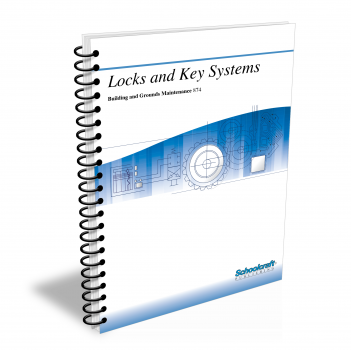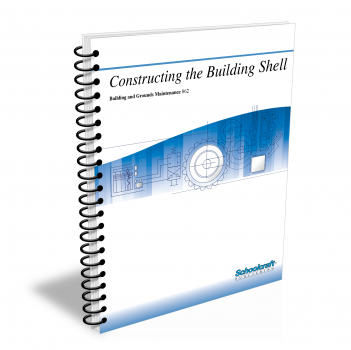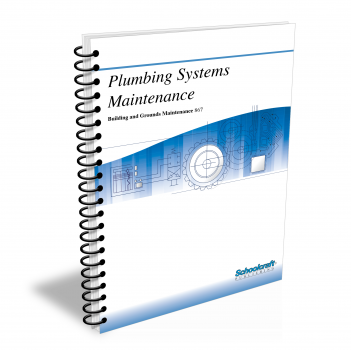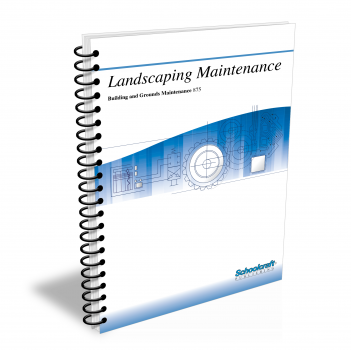Locks and Key Systems

Course Number: 874
The Locks and Key Systems textbook covers basic lock types: mortise, auxiliary or rim, tubular bolt, key-in-know, narrow stile, and unit lock. It explains how they operate, how to install, maintain, and adjust them. The textbook concludes by describing key control, master key systems, panic bars, and other accessories for building security.
Does your curriculum require additional topics not included in this textbook? Build a customized version of the Locks and key Systems textbook below.
Recommended Contact Hours – 10
Preview a Chapter
Available Supporting Material
- Table of Contents
- Exam Copies
- Suggested Titles
Table of Contents
Chapter 1: Commonly Used Doors and Locks
Topics: Terminology of locks and doors; Levels of building security; Mortise, auxiliary, tubular bolt, key-in-knob, unit, and narrow-stile locks
Learning Objectives:
- Use standard lock and door terminology.
- Differentiate between right-hand and left-hand doors, and between hollow-core and solid-core doors.
- List four different types of hinges.
- Explain installation procedures for full-mortise, half-mortise, full-surface , and half-surface hinges.
- Identify the mortise lock, auxiliary lock, tubular bolt lock, key-in-knob lock, unit lock, and narrow-stile lock
Chapter 2: How Locks Operate
Topics: Mortise lock mechanisms and installation; Rim spring-bolt locks; Jimmy-resistant locks; Tubular-bolt and key-in-knob lock installation
Learning Objectives:
- Describe how a mortise lock mechanism works.
- Tell what operations are involved in installing a mortise lock.
- Compare the functions of rim spring-bolt locks, rim bolt locks, and jimmy-resistant locks.
- Diagram the constuction of a tubular bolt lock.
- Explain how key-in-knob locks, unit locks, and narrow-stile locks operate.
Chapter 3: Installing Locks
Topics: Installing the mortise, auxiliary, tubular bolt, key-in-knob, unit, and narrow-stile lock; Lock tools
Learning Objectives:
- Explain how to position a mortise lock with the proper setback for installation.
- Describe installation procedures for an auxiliary lock, tubular bolt lock, key-in-knob lock, unit lock, and narrow-stile.
- List the tools needed to install locks.
Chapter 4: Maintaining and Adjusting Locks
Topics: Lock problems, disassembly; Opening a cylinder with and without a key; Cleaning lock mechanisms; Lubrication; Misalignment; Settling
Learning Objectives:
- Describe how lock problems can develop.
- List preventive maintenance practices that promote good -function.
- Describe the process of opening a cylinder both with and without a key.
- Tell how to clean and lubricate lock mechanisms.
- List common problems with bolts and latches and their remedies.
Chapter 5: Key Control and Master Key Systems
Topics: Advantages and disadvantages of master keying; Alternatives; Key control; Record keeping; Key storage and tagging; Other access control systems
Learning Objectives:
- Describe how a master key system operates.
- List the advantages and disadvantages of master keying.
- Differentiate between the maison system, keyed-alike system, and sectional system.
- List the information that must be included in the security survey plan, key progression chart, and key issuance files.
- Identify other access control systems, such as card-key systems, electronic systems, and push-button locks.
Request Exam Copies
Exam Copies
Ready to see a copy of our textbooks? After selecting which textbooks you’d like to review for your course, you can submit your request by either logging in or creating an account so we know where to ship your exam copies. A representative from Schoolcraft will contact you to confirm and finish processing your request.
Exam copies are always free and yours to keep.
Selected Exam Copies
none selected
* Maximum of five copies can be ordered



